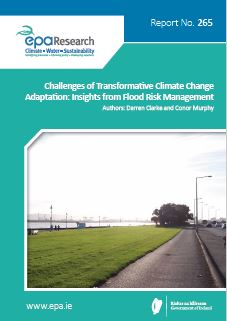Authors: Darren Clarke and Conor Murphy.
Summary: Increased attention is now being given to the need for transformative change in dealing with flood risks. This report addresses the lack of knowledge about the challenges associated with attempting transformative change, by drawing on findings from 11 flood risk management case studies across four European countries (Austria, France, Ireland and the Netherlands).

For all TRANS-ADAPT case studies the combination of changing flood risk with other societal pressures is driving transformation. Across all TRANS-ADAPT studies attempts at transformation were undertaken during “windows of opportunity”, typically following a major hazard event.
In Ireland, the publication of the first statutory National Adaptation Framework in 2018 placed a primary emphasis on developing appropriate short- and long-term responses to extreme weather, with a core focus on flood risks. This research first identified common challenges to transformative adaptation by drawing on an extensive review of the literature. The research engaged a broad range of sources including academic resources, policy documents and grey literature. Interviews for the Irish empirical studies were subsequently conducted with key stakeholders connected to proposed transformative flood risk adaptation measures (Clontarf, Co. Dublin, and Skibbereen, Co. Cork). In addition, questionnaires were distributed to residents in one of the case studies (Clontarf) on two separate occasions to examine in detail some of the core socio-cultural and governance challenges associated with attempting transformative adaptation.
TRANS-ADAPT research finds that demands for transformation arise from issues including:
More specifically, the Irish case studies illustrate:
TRANS-ADAPT studies demonstrated that priority should be given to identifying ways to increase communities’ participation beyond consultation and information sharing, towards co-creation of flood solutions for transformative adaptation. However, broad societal transformations to mitigate future climate change are needed, helping to reduce the need for transformative adaptation in the first instance. The findings emphasise key issues facing decision makers and communities if there are no fundamental changes to societal and governance practices concerning climate change and adaptation planning.
Separately, Irish case study findings have important implications for adaptation policy and planning. First, climate change threatens both tangible and intangible assets. Although current adaptation policies account for tangible assets in assessing adaptation strategies (e.g. economic damages from flooding), they also need to explicitly consider intangible assets (e.g. cultural values). The potential that flood defences proposed under the States’s €430 million investment between 2016 and 2021 may negatively transform communities/valued places suggests that this may be a key way of measuring successful future adaptation. Second, knowledge co-production and stakeholder trust for adaptation planning is likely to prove crucial as single actors rarely possess the knowledge, resources or legitimacy to address complex environmental challenges. Finally, there is merit in integrating virtual technologies to enhance information management between stakeholders in adaptation planning, helping to elicit emotional responses from individuals and making climate change locally relevant.
https://www.epa.ie/media/epa-2020/publications/research/Research_265_Thumbnail[1].jpg